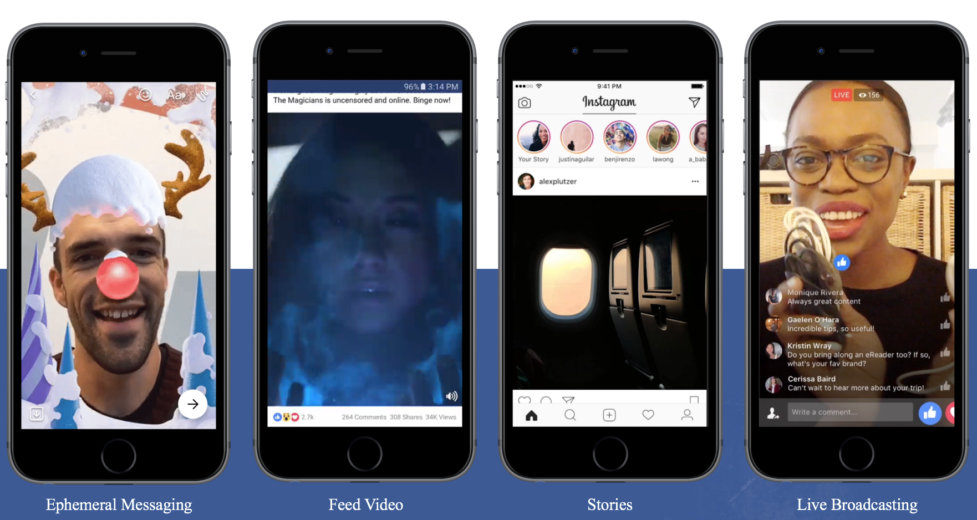According to Facebook, time spent on video is skyrocketing. In a recent internal study performed by the social giant they predict that 75% of all mobile data will be video by 2020, a 150% increase in video consumption on Instagram is expected in the next six month and currently 100M hours of video are watched everyday on Facebook.
With this type of consumption taking place in the market platforms are trying to get ahead of the trend by making it easier than ever for advertisers to create and share visual content. The video first strategy is driving platforms to make experiences more natural and playful. Facebook specifically has four ways to users can create video within their suite of apps.

In addition to user generated content Facebook is creating new advertising products to match consumption including feed features and new ad experiences.
Feed Features include:
- Vertical Video in news and Instagram feed
- Auto expand in news feed
- Sound on in news feed
New Ad Experiences include:
- Instream on the Audience Network
- Instream on Facebook
- Story Ads on Instragram
- Collection on Facebook
Creative Considerations In The Video First World
The biggest change we want to highlight is the shift in what is considered video. In a world that has been primarily dominated by television as the means to distribute content with movement to consumers video is associated a labor intensive, expensive process that results in a 30 – 60 second spot. Online and social platforms are flipping this notion upside down. Video at any length is creeping it’s way into your newsfeed and often times the shorter formats are the most successful. Generally speaking ads with movement anywhere between 1 second to less than 15 seconds are being published as video and very well received by consumers. Facebook recommendations state that building for less than 15 seconds matches consumer mobile attention and increases message completion.
In the past year we saw a trend of people building video content specifically for mobile social platforms. Big trends were designing for sound off, trying to make stories more visual, throwing the brand out there earlier in order to capture that brand awareness knowing completion rates would be lower. While nothing has drastically changed Facebook has given us a few suggestions on how to push videos to the next level.
- Use text and graphics (The 20% rule doesn’t apply in video
- Build for a vertical (Takes up more space on mobile)
- Play with video lenghts
- Test new formats (Cinemagraphs are the big trend right now)
Reaching Parents Using Cinemagraphs
In the past year Connections Academy, an online education provider, has been working on a social strategy to match their innovative approach to public school. Most recently diving into the world of Cinemagraphs… Within a week of deciding to test we had the two ad variations in rotation.
The goal two-fold: testing to see if Facebook claims that the algorithm prefers video content and if this slight movement is effective in capturing audience attention. These findings are based on a small audience, but have convinced us it is worthwhile to roll these out to a wider scale audience.

Optimized for even rotation within our test ad set it’s clear the algorithm gave preference to the cinemagraph ads. It’s also evident through the total % of engagement that our cinemagraph ads received more attention from our target audience. As we roll this test out to a larger scale our metrics will change slightly to ensure that we are not only getting attention, but the right attention. We will gauge this measurement through our conversion and cost per conversion.
Encouraged To Play
The definition of video within the advertising space is being transformed along with the stigma that has developed with the 60+ years where television has been the dominant platform for brands to utilize movement. With Facebook making it easier paired with our preliminary Connections testresults, we’re encouraged to get out there and play with resources we have to create movement and optimize our social presence to fit in a video first world.



